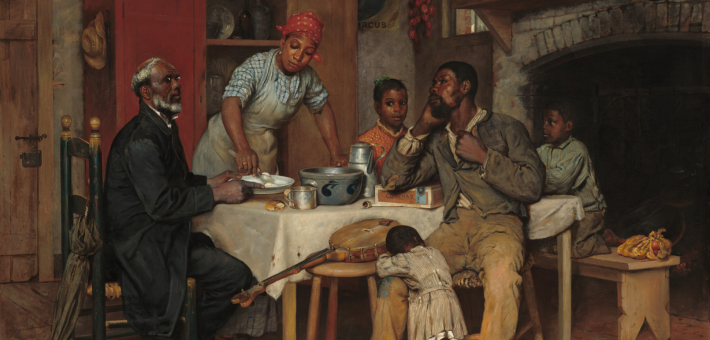Commentary on Romans 6:12-23
Imagine that you quit a job, and then you keep going back to work there. You return to your locker, or your parking space, your cubicle. You log into your computer. You begin answering email and managing projects.
But wait. That wouldn’t work, would it? Your coworkers would be confused. Your password wouldn’t work anymore. Your boss would wonder if she should engage you in conversation before or after she called security. It makes no sense to go back to a job you don’t have anymore.
Likewise, it makes no sense to go back to a slavery you are not subject to anymore.
In Paul’s letters, sin is an enslaving power. Paul does not imagine sin as separation, or brokenness, or as moral imperfection. Sin is that power that vies with the Creator for control of creation to such an extent that Paul can speak of humanity’s having been “enslaved to sin” (Romans 6:6).1
One of the hallmarks of slavery, ancient or modern, is that slaves do not have control over their own bodies. The enslaver may force the enslaved into labor, inflict corporal punishment at will, or assault the enslaved sexually with no fear of prosecution for a crime. To be enslaved to sin is to be appropriated, body and soul.
In Romans, Paul argues that sin’s mastery over humankind has been broken by the death and resurrection of Jesus Christ. Those who had been enslaved by sin have been buried with Christ in baptism. While death is a drastic form of escape, it is an effective one. Paul says simply, “whoever has died is freed from sin” (Romans 6:7). In the cross of Christ, sin is shown to be capable only of destruction, and after Christ is destroyed, sin has no cards left to play. Its hold is broken, as testified to by the resurrection.
Baptized into Christ’s death and resurrection, we have been freed from slavery to sin. Why, then, would we ever go back to the old job? “Do you not know that if you present yourselves to anyone as obedient slaves, you are slaves of the one whom you obey, either of sin, which leads to death, or of obedience, which leads to righteousness?” (Romans 6:15).
Romans 6:12 is a plea to leave the bondage of the past in the past. Just as Paul appeals to readers in Romans 12:1 to “present your bodies as a living sacrifice,” here Paul urges us to “present yourselves to God as those who have been brought from death to life, and present your members to God as instruments of righteousness” (Romans 6:13). A professional athlete who has been traded to a new team does not keep playing for their old team. Likewise, those who have been brought from death to life do not keep playing on death’s team.
The text presents us with two potential challenges for preaching. First, many contemporary Christians cannot hear good news in Paul’s characterization of our new lives as “freed from sin and enslaved to God” (Romans 6:22). It is much easier for many of us to think of ourselves as belonging to God rather than being enslaved to God. Still, the preacher needs to sit with the harder metaphor on behalf of hearers. True, those of us who are temporarily able-bodied and financially stable have a love affair with our perceived autonomy (“we have never been slaves to anyone”), but might that love affair itself be a symptom of enthrallment to sin and denial of death? Maybe the Hymn of the Day for this reading should be Bob Dylan’s “Gotta Serve Somebody.”
The second challenge for the preacher is the propensity of Christians to keep playing for the old team, even after we have been traded—or bought—by Christ for God. “Should we sin because we are not under law but under grace?” (Romans 6:15). “By no means!” Paul exclaims. And yet continued fear, love, and trust of things that are not God—continued idolatry—threatens us daily.
Paul’s answer is not to deny the problem of sin’s continued enthrallment for his readers (Romans 7, with its concern over doing “the evil that I do not want” follows this reading). In the face of temptations to live in the old life, Paul proclaims the new one. Yes, we continue to be threatened by sin, but we do not belong to sin any longer. We have been baptized into Christ. It is not in the nature of our identity in Christ or our destination—eternal life (verse 22)—that we should linger with that which leads to death (verse 16). To preach this text is to proclaim hearers’ new identity and destination in Christ, and to invite them to show up in the new workplace rather than return to the old one.
I once heard a presiding minister invite a congregation to Holy Communion by saying, “Receive what you are. Be what you receive.” The assembly would receive the body of Christ at the table in order to be the body of Christ in the world. Romans 6:12-23 does not use eucharistic language, yet the call to be what we have received echoes that to which Paul is here calling his readers.
Notes:
1. For more on Paul’s understanding of sin, see Beverly Gaventa, “Watch the Horizon,” 23-46 in When in Romans: An Invitation to Linger with the Gospel according to Paul (Grand Rapids: Baker, 2016) and “The Cosmic Power of Sin in Paul’s Letter to the Romans: Toward a Widescreen Edition” Interpretation 58/2 (2004): 229-40, reprinted in Our Mother Saint Paul (Louisville: Westminster John Knox), 125-36.


July 2, 2023